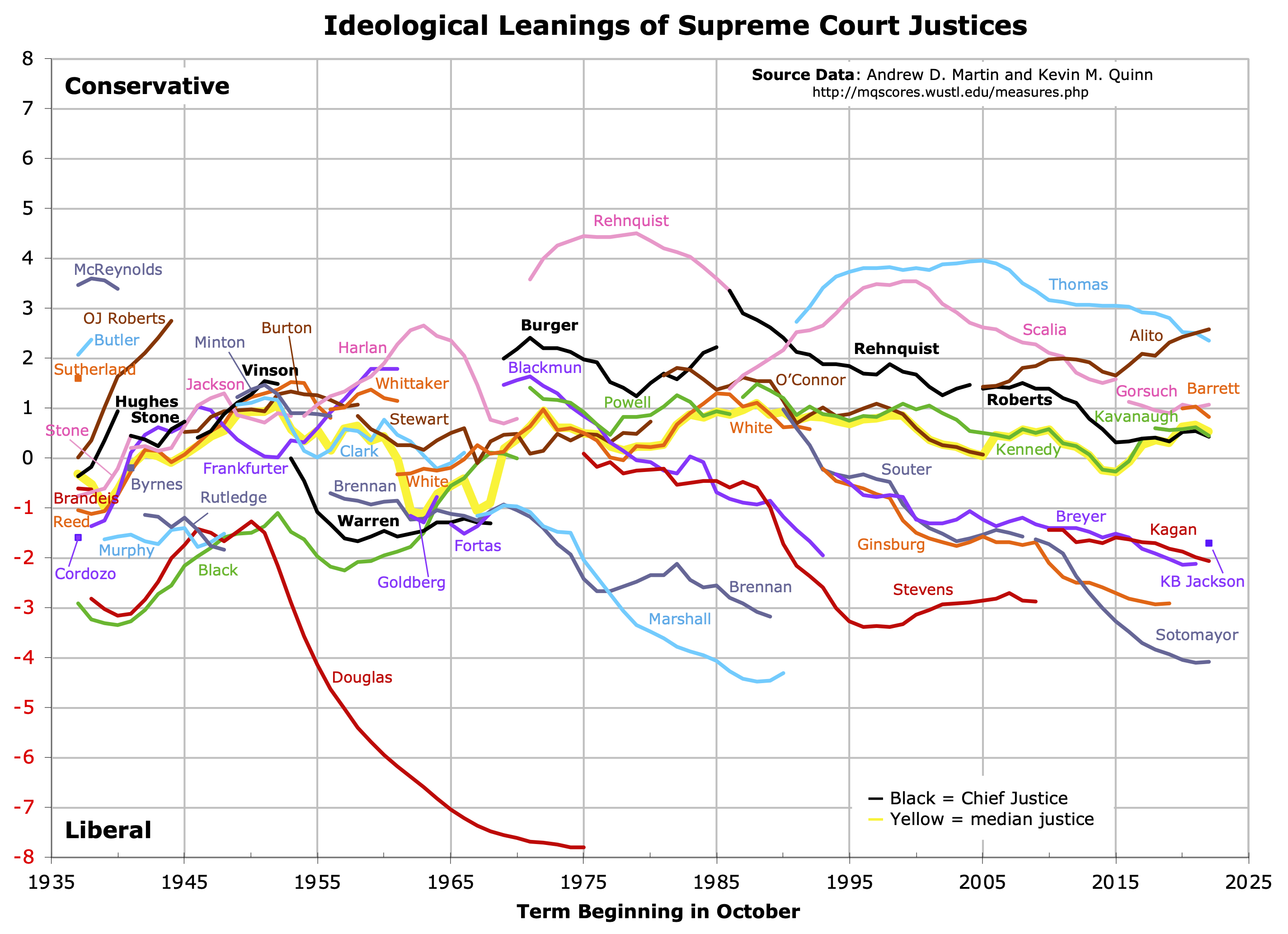Martin–Quinn Score on:
[Wikipedia]
[Google]
[Amazon]
Martin–Quinn scores or M-Q scores are dynamic metrics used to gauge the ideology of a U.S. Supreme Court Justice based on their voting record. Therefore, a jurist's score will continuously change, unlike static measures of ideology such as the Segal–Cover score and

Judicial Common Space
The Judicial Common Space (JCS) is a strategy to compare the ideologies of American judges. It was developed to compare the viewpoints of judges in the US Supreme Court and the Court of Appeals. It is one of the most commonly used measures of judi ...
score. Martin–Quinn scores are among the most commonly used measures of judicial ideology.
Background
Political scientists have written at length about measuring judicial ideology. The majority of legal scholars have rejected as oversimplified the thesis that judicial decision-making is explained by ideology. In 2010 Ho and Quinn published a paper attempting to "clarify some major misconceptions in the literature". Martin-Quinn scores are one-dimensional. Judicial ideal points estimated in a unidimensional space corresponding to conventional perceptions of a liberal-conservative spectrum are just as likely to represent jurisprudential differences as ideology: "While the measures correspond to conventional perceptions of the left-right spectrum of the Court, such shorthand does not mean that the scale accords with a coherent political policy or pure policy preferences untethered from law."History and method
The concept of the Martin–Quinn score was published in a 2002 paper by Andrew D. Martin and Kevin M. Quinn. The Martin–Quinn score usesMarkov chain Monte Carlo
In statistics, Markov chain Monte Carlo (MCMC) is a class of algorithms used to draw samples from a probability distribution. Given a probability distribution, one can construct a Markov chain whose elements' distribution approximates it – that ...
(MCMC) methods to fit a Bayesian
Thomas Bayes ( ; c. 1701 – 1761) was an English statistician, philosopher, and Presbyterian minister.
Bayesian ( or ) may be either any of a range of concepts and approaches that relate to statistical methods based on Bayes' theorem
Bayes ...
model of ideal points. The ideal points can change over time due to the item response model. MQ scores are theoretically unbounded (have no minimum or maximum values). MQ scores are dynamic, as each decision made by a judge creates another data point that can be integrated into the model. The MQ score places the justices on a continuum of more liberal to more conservative. As of 2007, scores roughly ranged between -8 and 4, with the lowest score of about -8 attributed to William O. Douglas
William Orville Douglas (October 16, 1898January 19, 1980) was an American jurist who served as an associate justice of the Supreme Court of the United States from 1939 to 1975. Douglas was known for his strong progressive and civil libertari ...
(tenure on the USSC from 1939 to 1975) and the highest score of about 4.5 attributed to William Rehnquist
William Hubbs Rehnquist (October 1, 1924 – September 3, 2005) was an American attorney who served as the 16th chief justice of the United States from 1986 until his death in 2005, having previously been an associate justice from 1972 to 1986. ...
(tenure from 1972 to 2005). The largest shift in score between judges on the same Supreme Court seat since 1953 came when Thurgood Marshall
Thoroughgood "Thurgood" Marshall (July 2, 1908 – January 24, 1993) was an American civil rights lawyer and jurist who served as an associate justice of the Supreme Court of the United States from 1967 until 1991. He was the Supreme C ...
(tenure from 1967 to 1990) was replaced by Clarence Thomas
Clarence Thomas (born June 23, 1948) is an American lawyer and jurist who has served since 1991 as an associate justice of the Supreme Court of the United States. President George H. W. Bush nominated him to succeed Thurgood Marshall. Afte ...
.
Ward Farnsworth wrote that while the MQ model has ingenuity and promise, it falls short of proving what it aims to. He criticized the methodology of MQ scores, saying that MQ scores only take into account whether a judge affirms or reverses a ruling, and not the ideological outcome their action supports. In part, "the relationship between the spectrum generated by the artin–Quinnmodel and the spectrum of policy decisions in the real world is a matter of guesswork. There is no inherent relationship between them.
Application
MQ scores were initially developed to measure and compare the ideological leanings of current and former U.S. Supreme Court justices. They have since been applied to the judicial systems of other countries, including Argentina, Belgium, Brazil, the Philippines, Portugal, Spain, Taiwan, Turkey and the United Kingdom.
References
Supreme Court of the United States Political spectrum Rating systems Political science {{DEFAULTSORT:Martin-Quinn score